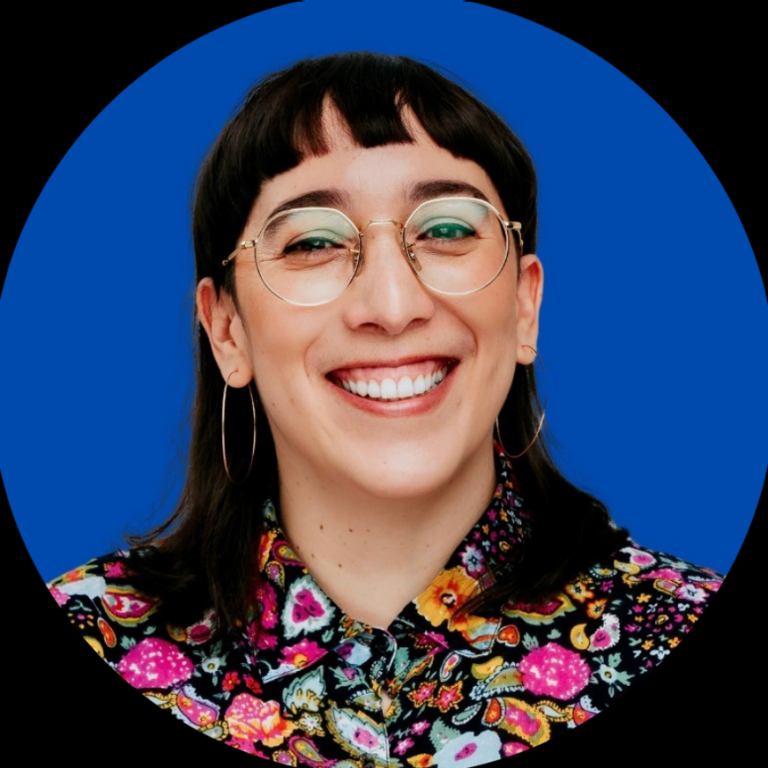Lina Moreno
Master of Arts (MA)
Art Education
Lina Moreno is a facilitator and art educator from Colombia, now based in Tiohtià:ke (Montreal). They design project management training and support for professionals and teams working on creative and community projects. They also work in Systems and Process Design, at Purppl, a Social Enterprise based in British Columbia.
Question 1: Tell me about yourself. Who are you?
I am a queer immigrant, a facilitator, an artist, and part of many communities here and in Colombia.
I studied Fine Arts in Bogota, and soon after graduating from my BFA, I started teaching arts to pre-school children. I truly enjoyed that role! The school where I taught was part of the Primary Years Program (PYP) from the International Baccalaureate (IB), a program based on the Reggio Emilia pedagogy. That is where I started learning about emergent planning. We started every unit by presenting an experience to the students and planned the subsequent classes based on their responses and interests.
This approach adapted to what emerged organically in each session. That is where my interest for pedagogy and Art Education started. This curiosity led me to move to Montreal and pursue a Master's in Art Education at Concordia. Although my current work is quite different, the responsive and iterative planning I learned early in my career, is still part of my approach when planning creative projects.
Question 2: What are you doing right now? How does your present work relate to art and art education?
After graduating from my master's at Concordia, I worked in the non-profit sector for almost a decade. There, I managed a training program for emergent Indigenous artists and collaborated with a wonderful team to develop workshops on a variety of professional skills for artists.
During that time, I pursued training in project management and noticed a gap in accessible content and tools tailored specifically for creative projects, which are hard to map out in a linear way.
This led me to launch a business where I provide project planning training and support to professionals and teams working on creative and community-based projects. Project planning can be a supportive tool to foster iteration, collaboration, and efficiency beyond traditional productivity culture. I like offering a structure for people to learn to pace themselves, prioritize, and collaborate. It sounds counterintuitive, but a structure to create more flexibility and feel more grounded, connected and creative.
Question 3: How did Concordia’s ARTE program prepare you for what you are presently doing?
I completed my master's with Dr. Juan Carlos Castro, whose research on creative constraints was key to understanding the balance between structure and flexibility. His work focused on how creative constraints can enable the conditions for new ideas to emerge.
In my thesis, Talking About Images; Possible Conversations in Art Education, I explored the balance between making art and talking about art. I was interested in blurring the line between the two and creating interventions where talking was a way of making and making was a way of talking. Under Dr. Castro’s supervision, I worked with a methodology called design-based research. This methodology is structured in iterative cycles where there is also an element of responsive or emergent planning. It was interesting, once again, to find a rigorous research structure that enabled responsiveness and flexibility. I apply what I learned as I design workshop iterations and blur the line between planning and making.
The ARTE program also provided me with valuable connections that continue to shape my work. I’ve built long-lasting relationships with professors, peers, and collaborators, and those connections remain a vital part of my creative and professional growth.
Question 4: Describe one of your positive formative experiences while you were in the program at Concordia.
A formative experience that immediately comes to mind is working with Dr. Castro as a research assistant. His mentorship was incredibly hands-on and practical, and it allowed me to learn about design-based research through direct involvement. I was part of a small research team, and we collaborated closely, learning from one another. I contributed to data analysis, tagging photos, building databases, and helping with the overall research process. This experience gave me insight into how research projects unfold from initial design to publication. The opportunity to learn by doing was invaluable, and it’s something that continues to influence how I approach my work today. I am incredibly grateful for Dr. Castro’s mentorship and support during that time.


